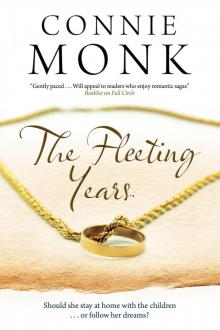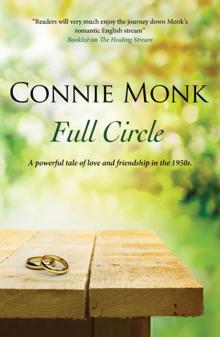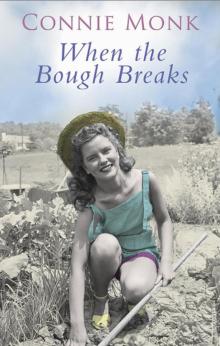- Home
- Connie Monk
The Fleeting Years Page 29
The Fleeting Years Read online
Page 29
‘You never fail me, you never have.’
‘I fail us both. Look at me!’ And he threw the bedcovers back to expose the hopelessness. ‘Yet, Zee, if I don’t have you I – I – I can’t think of anything but how much I want—’
‘Tonight will be wonderful,’ she whispered, her mouth almost touching his. Then she moved to kneel bending over him, kissing his forehead, his mouth, then slowly down to his chest, moving her tongue on his stomach, then down. She heard his sigh and didn’t raise her head, there was no need, the sound was message enough and then, just as he’d longed, her mouth held him, her tongue caressed.
If only he could relax into certainty, but he was frightened, terrified that without warning all tangible sign of his desire would disappear. So often lately at the last moment, while his mind was filled with need and his body ready, suddenly hope would be stripped from him. But tonight it would work for both of them, it must. ‘Now Zee, yes, yes, please God yes …’ If she stopped what she was doing and he moved onto her, would he be no use again? As he made his first movement she bent over him, pushing him back to lie flat while she straddled him and lowered herself. He lay quite still, frightened to move in the wonder of what was happening. They looked at each other in the soft light of the bedside lamp and she felt that never in all their years had they been closer than at that moment.
For her the miracle was quick. She clenched her teeth in her battle not to cry out in this crowded house and, lying beneath her, Peter watched her as she was transported to a wonder beyond imagination, never once losing eye contact with him. Then she leant down against him, out of breath and filled with thankfulness. For him it wasn’t over and for that she sent up a prayer of thanks. When she started to move again she knew from the sudden change in his breathing that his moment had come. So often lately this had been denied him but this time he climbed his mountain, not feebly but with strength that held him on the peak as he writhed under her. Remembering that rooms both sides of theirs were in use she held her hand over the mouth he didn’t have the control to close, holding back his cries. Then, at last he lay still, breathless and filled with joy and thankfulness. Then, looking at each other, their expressions said it all. In their joy they laughed.
‘What a perfect way to end a birthday,’ she said a moment later, snuggling down in bed.
‘Um, yes, perfect. Only one thing I want now.’
‘Not a pee?’ she chuckled.
‘No. A cuddle. Wriggle closer.’
The success of the end of his birthday seemed to have done him good, for when they saw their overnight guests off next morning he looked brighter than he had for days. Tom and his family weren’t going back until after lunch so the morning was a leisurely time, a game of tennis on the court that was marked out every summer now that there were young people to use it again.
‘Dad seems very bright and fit, Mum,’ Tom said when he wandered over to where she was deadheading the roses. ‘When we got here I thought he was looking tired, different somehow. A bit drawn.’
‘Perhaps he was dreading getting to seventy-five. Now he’s there he knows it’s no different from being seventy-four. And I think he’s excited at the prospect of getting under the skin of his dear King Lear again.’
‘I bet he is. But he’ll find it frustrating, filming it out of sequence.’
‘He won’t let his beloved Lear down. He knows it so well even after all these years; he will be wonderful. And I know he is flattered and grateful that the part has been offered to him. We’ve found a funny little cottage. No, not funny – quaint. It’s on the edge of the village, surrounded by fields. Someone has obviously bought it for holiday lets and had mod cons – up to a point – put in. A rather ugly electric water heater over the bath, no shower, but it does have a flush loo. Where it flushes to I didn’t enquire, I suppose a septic tank somewhere. We shall be fine and I can keep an eye that he gets a proper meal at the end of the day and goes to bed early to make up for the crack-of-dawn starts. There’s no television or radio but we shall take a portable radio and a record player.’
‘You’ll come to see us while you’re there, won’t you? Maybe he’ll get a few days free of filming sometimes. But I expect if he does you’ll want to get back here to check on the Marchand Headquarters. But come whenever you can, won’t you. I’m playing the Bruch G minor in Oxford on the twenty-eighth. Any chance of your getting there?’
‘One of my very favourite concertos. Every chance, I should think.’
But no one is master of his own destiny.
It was halfway through the morning of the twenty-seventh that the phone rang. Most days during his waiting moments Peter called her, often more than once during the course of the day. He never used to in the days when he left her at Newton House and was away for a week or more at a time, but having her so relatively near the studio it seemed natural to both of them that they should speak more often even though the calls were brief.
‘Hi, Peter, you’re early today. Not much on?’
‘Mrs Marchand?’ the voice of a stranger enquired.
‘Yes?’ An affirmation and an enquiry in one. With a mother in her nineties that was where Zina’s immediate thoughts flew.
‘I’ve been told to phone you. We found your number in Peter’s pocket. He has been taken ill. I’m so sorry.’
‘Ill? But he was fine when he left here. How do you mean, ill?’
‘He collapsed. We’re waiting for an ambulance. Can you come?’
They had considered bringing just one car, but never had she been so thankful that they decided on two as she was as she sped towards the film studio. She arrived as the ambulance was just driving away.
‘They’re taking him to Oxford,’ Isaac Roache, the director, came to open her car door. ‘I’ll get my car and tell you as we drive.’
‘No, I must take my own car in case they say I can bring him back. I can look after him if they say he has to stay in bed for a bit.’ She wouldn’t admit to the thought of anything worse.
‘Yours is all right where it is. I’m driving you. This is mine. We’ll talk as we go.’
She seemed to have lost all power of resistance and felt shaken and uncertain, frightened to let herself think and yet incapable of keeping at bay visions of every tragedy, as she followed him to his car. It was as they drove towards Oxford that he told her how Peter had seemed perfectly normal as shooting started, then just for a moment had looked bemused as if he didn’t know where he was or what he was doing.
‘When I spoke to him it was as if he didn’t hear me, wasn’t on the same planet. Frightened me for a minute. Then, just as suddenly as it had happened, so it was over. He picked up just where we had been before.’ She remembered that other time in the garden. ‘It was about ten minutes after that; the camera just panned in on him for a close-up and, with no warning, down he went, out cold.’
‘How long was he unconscious? How was he when the ambulance people came?’
‘He hadn’t come round. Zina, the medics couldn’t get a response. They’ll be trying now, on the way to the hospital.’
With every fibre of her being she pleaded silently that he wasn’t ill, seriously ill. Perhaps he was overtired; perhaps he would have to accept retirement. After all most men had been retired ten years or more when they reached his age. So she silently bargained, pleaded, even clutched at hope as they approached the hospital.
But it wasn’t to be. For a while they waited and then she was called into the Senior Nurse’s office where the news was broken to her. Peter had suffered a massive stroke and had died without regaining consciousness. There were formalities to be got through, and somehow, like a zombie, she gazed at the staff as they talked to her, shook hands with the doctors who had signed the certificate, made arrangements for his body to be carried back to Devon. How much of the organizing was her doing and how much Isaac’s she could never remember afterwards, the whole scene was like a living nightmare, one from which she knew there would be no waking.
>
Isaac drove her back to the cottage where there were two cars waiting. One was her own which, unbeknown to her, Isaac had had brought back while they were at the hospital; but in her state of numb misery she wasn’t surprised that it should be there. And neither did she feel any emotion when she recognized the second one and knew Tom was waiting for her, having had a phone call from Isaac. Yet she hadn’t even been aware at the hospital of what he was doing or that he was making phone calls. It was probably he, too, who made an announcement to the press and the media.
That same evening at Myddlesham where Jenny and her companion Edith Hume listened to the ten o’clock news, they heard the announcement.
‘I can’t believe it! There was never anything wrong with him.’ Jenny was torn between genuine concern and pity for Zina, a feeling of shame for the hundreds of times she had tried to score points against Peter and, perhaps even stronger than that, she silently acknowledged the truth that he must have been aware of how she tried to slight him and yet he never seemed to hold it against her.
‘Poor, poor Zina. They were such a united couple. Whatever will she do?’ Edith muttered as Jenny turned off the television. The rest of the news and tomorrow’s weather forecast had lost interest for them.
‘She’ll do the same as you did and I did,’ Jenny answered, ‘she’ll pick up the pieces and make the best out of what is left to her.’
The next day there wasn’t a newspaper that didn’t find a space on the front page. Peter had been a household name for forty-five years, from handsome young matinee idol to master of the classical stage. In Myddlesham where she was now the mother of a grown-up family, the erstwhile local baker’s young daughter who used to have his pictures pinned to her bedroom wall was one of thousands up and down the country who, even if they had never met him, felt something had gone out of their lives.
The following year, on a July evening, Zina sat in the garden watching the sun sinking. It was that moment just before dusk when the world is hushed. She closed her eyes and yet, still looking into the sun, the world before her was filled with a red glow. Was it simply the brightness from the sun seen through her closed eyelids? She felt it was a glimpse into that timeless, endless space where surely his soul still lived. A smile touched the corners of her mouth.
When she felt a hand on her shoulder she raised her own to cover it.
‘Were you asleep, Mum? Sorry if I disturbed you.’
In a second she was back in step, her moment of wonder gone and yet leaving her less lonely, less frightened of the stretch of empty days without him.
‘No, I was awake,’ she answered with the smile they all expected, ‘I was just enjoying the last rays of the sun.’
‘Glorious, isn’t it. Seems a shame to drag you in, but Clara said to tell you it’s food time.’
Together they walked back to the house where comfortable, pregnant Clara was just bringing the tray through to the dining room. The changes at Newton House had been Tom’s idea. It was about six months ago when he, Clara and little Steve had moved in. For their older children too it was a base, ‘home’, although they had officially moved on and were busy with their own lives. At that time it was just becoming apparent to the most observant that at nearly forty-four Clara was again pregnant. But nothing fazed her and now, with the baby due to arrive, she plodded happily through her days, loving where life had brought her.
When Tom had suggested to Zina that they should come back, she had been frightened that they were proposing it because they didn’t like to think of her being alone. But she had been wrong, at least in part.
‘This has always been home, the place to come back to,’ he told her earnestly, then added with a smile that said more than any words. ‘We wouldn’t get underfoot, Mum, and it worked when we were here way back. When I remember how it was for Fiona and me when we were kids, the Marchand Headquarters. I want it to be like that for Steve and this next one.’ And any day now that new life would join them, the latest Marchand to find the magic that had been there for all of them.
And so Newton House once again became a family home, the garden a place for children at play, today’s, tomorrow’s or the ghost of yesterday’s.
For Zina there could be no way back to the life she had known; her own capacity for joy had been lost with Peter. But as time passed she found peace. Perhaps it stemmed from the sound of the two little children playing, such an echo of the time that was gone; or from Clara’s never failing good humour; from her own pride and love for Tommy as they made music together, she on the piano and he the violin; from the peace Jenny found as at nearly ninety-four she came to her final hours.
These things must have made the backdrop for her certainty of what would one day come to her, but she found her strength in something more. Sometimes, usually when she was half awake and half asleep it was as if Peter were with her, she seemed to hear his voice; brief flashes of time belonging just to them. She said nothing of this to anybody, not even Tom.

 The Healing Stream
The Healing Stream The Fleeting Years
The Fleeting Years Full Circle
Full Circle When the Bough Breaks
When the Bough Breaks